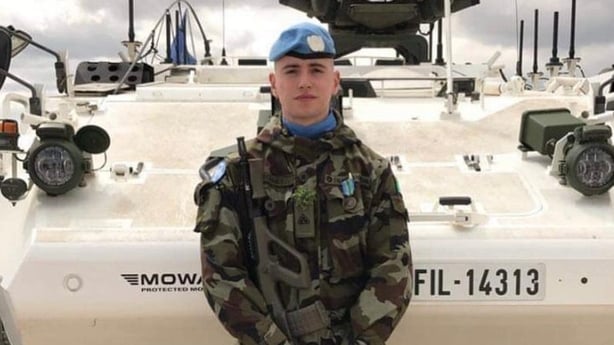"If you need to set-up some lights for the interview, you'd better call after two o'clock this afternoon."
The former Lebanese Cabinet Minister added, while speaking to me on his mobile phone: "Before that, we have no electricity."
Welcome to Lebanon in 2022, a country roiled by a dramatic economic collapse and the devastating impact of an explosion at the capital's port in 2020, which killed more than 200 people and wrecked the city's infrastructure.
At a time when the currency collapsed by 85%, the country was also trying to accommodate more than one million Syrian refugees.
Today, there is only between four and six hours of guaranteed electricity supply in Beirut each day, and so people have to work around it.
Cameraman Mark Ronaghan and I could not wait until the afternoon, so we agreed to meet Dr Richard Kouyoumijian at his apartment in Achrafieh district.
No electricity also meant we had to hump our gear up several flights of stairs, as the lift did not work.
At night, much of a city which is home to more than two million people is plunged into darkness.
When I was in Beirut last May, and being driven through the city late one night, it was startling to see how few apartments were illuminated.
My taxi driver joked: "Welcome to Beirut: the most romantic city in the world."
In Beirut, the lights do not work normally. The banks do not work normally. And not much else either - including the legal system.
Small wonder so that an investigation into the killing of an Irish UN peacekeeper is something that people here are sceptical about when it comes to securing justice.
Those who I met today on the streets of the capital were, bar one, not convinced that justice would be served.
People did not want to give their names, but they did want to convey just how upsetting they found what happened.
One man told me: "He's like my own child – this incident has left a significant impact on me. I’m not sure what else I can say. When you ask me a question like this, I choke and immediately tear up. It’s truly tragic what happened."

Probe a little further, and the doubt emerges about the capacity of Lebanese authorities to deliver justice.
One man told me the only option was for the Irish to get involved.
He said: "We call on the Irish government to serve justice however it deems fit.
"Over here, it's become well-known who’s in power; the most trivial of murder cases here doesn’t even get solved. The Irish government should take matter into its own hands and not trust the Lebanese judiciary system, nor the government."
When the killing of Private Seán Rooney first became known, suspicion fell on Hezbollah - the Shia movement which has both a military and political wing - and which draws its support from southern Lebanon.
Within hours, however, Hezbollah denied any involvement. This was not just any statement, it was written by the organisation's powerful head of security Wafiq Safa.
People who were sympathetic to Hezbollah, a party in the coalition government, did not want to go on the record.
However, they told me that the UN armoured vehicle had driven into a village unexpectedly - therefore, it could not have been a targeted killing.
The deeper issue, however, is how Hezbollah is representing the UN presence in southern Lebanon to its membership and supporters: the peacekeepers, its claimed are infringing Lebanese sovereignty.
There are also whispers that, as a woman told me today down by the harbour in Beirut, that the UN are working hand-in-glove with the Israelis.
She said she would not say anything on record as it was inevitable she would be branded an anti-semite.
Read more: Private Seán Rooney to be buried with full military honours
I tried to make contact with two Hezbollah MPs yesterday, as efforts to contact the organisation's media unit had yielded nothing. The MPs did not reply.
Another southern Shia block with both a political and military wing is Amal.
Its leader Nabi Berri is the Speaker of Parliament and his powerbase is Tibnin - where Irish UN peacekeepers had their base for more than 20 years.
I encountered a man sitting outside an Amal office in Beirut and he told me he was confident justice would be served: "Justice ought to be served, because the ones who are following up with the case are Hezbollah and Amal Movement who would never let anyone cross the line and threaten the safety and security in the south. They’re at the forefront of justice and peace in the south of Lebanon."
It has to be said, that is a view not widely shared beyond Amal and Hezbollah.
The mainly Christian party of Lebanese Forces bluntly pins the blame on Hezbollah.
That is why I climbed the stairs to meet Dr Kouyoumijian, the former Minister, in Beirut's Achrafieh district.
He claimed that Hezbollah had the power to frustrate the judiciary.
That said, the Lebanese Government has been absolutely clear that justice will be served - and quickly.
Minister for Foreign Affairs Micheál Martin has declared that the Irish Government is "determined to get the truth".
But he also warned that getting to the truth would be "challenging".
Here in Lebanon, no-one would disagree with him.







